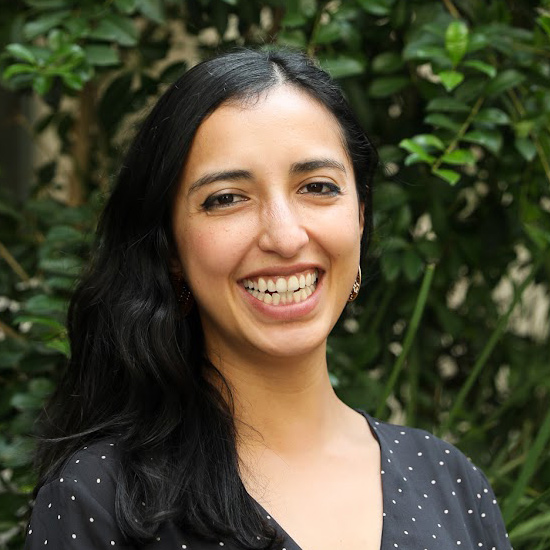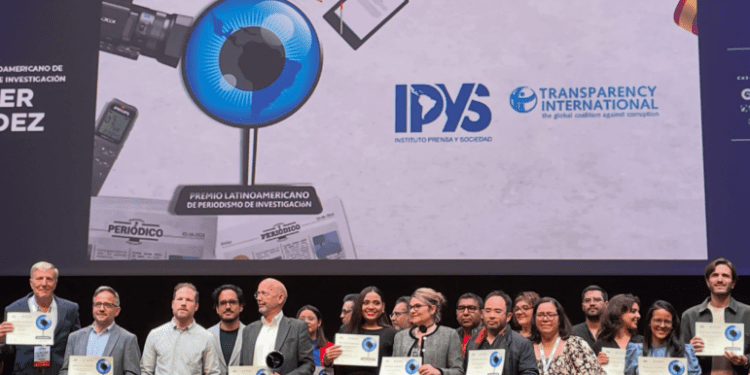GIJN Executive Director Emilia Diaz-Struck, OCCRP Africa Editor Beauregard Tromp, GIJN Spanish Editor Andrea Arzaba, and GIJN Francophone Africa Editor Maxime Koami Domegni (left to right) took part in a 2024 COLPIN panel on the opportunities for cross-border collaboration between Latin American and African investigative reporters. Image: Courtesy of COLPIN
GIJN also joined a panel on investigating digital threats, and election disinformation, and one on networks that support Investigative Journalists around the World.
One of the highlights of the conference was the announcement of the Javier Valdez Latin American Awards for Investigative Journalism and the API Awards from Investigative Journalism in Spain. The gala took place at the CaixaForum in Madrid.
The first-place Javier Valdez Award was given to the television report OperaciĂłn CacerĂa (in English: Operation Hunt) by journalist Ricardo CalderĂłn, which detailed the kidnappings executed by the Venezuelan regime against opponents.
Santiago O’Donnell, one of the members of the jury, said about the investigation: “It is very hard to have secret documents from antagonistic countries. This is a story as well told as it is documented.”
Redes de Nicotina: Nuevos Productos, Viejas Estrategias (in English: Nicotine Networks: New Products, Old Strategies) was awarded second place for a collaborative investigation by a team from five Latin American countries.
Third place was shared between Caso Hermosilla: el audio que sacudiĂł al paĂs (in English: The Hermosilla Case: the audio that shook the country) by Chilean journalist Nicolás SepĂşlveda from CIPER, and Rehenes de la Ley (in English: Hostages of the law), an investigation that dug into the practices of Sippenhaft in Venezuela. The awards were given to reporters Patricia Marcano and Joseph Poliszuk from Armando.Info
At the ceremony, the Association of Investigative Journalism of Spain (API) also presented their national awards. The API Local Journalism Award went to Estafa en la tienda de congelados (in English: Scam in the frozen food store), published by Lara Graña in Faro de Vigo.
Pablo Almoguera from El Confidencial received a special mention in the Local Journalism Award category for El comisario, su confidente y un triángulo a martillazos: corrupción y celos en Fuengirola (in English: The commissioner, his confidant and a hammer triangle: corruption and jealousy in Fuengirola).
In the Data Journalism category, the winner was RadiografĂa de la Sanidad Española (in English: X-ray of the Spanish Health Service), for an investigation carried out by RTVE, the Spanish Radio and Television Corporation.
 Andrea Arzaba is GIJN’s Spanish editor and also serves as director for its Digital Threats project. As a journalist and media professional, Andrea has dedicated her life to documenting the stories of people in Latin America and Latinx communities in the United States. Her work focuses on issues around freedom of expression, climate change, migration, and women’s leadership.
Andrea Arzaba is GIJN’s Spanish editor and also serves as director for its Digital Threats project. As a journalist and media professional, Andrea has dedicated her life to documenting the stories of people in Latin America and Latinx communities in the United States. Her work focuses on issues around freedom of expression, climate change, migration, and women’s leadership.
Source link : http://www.bing.com/news/apiclick.aspx?ref=FexRss&aid=&tid=672b46b984394b54bb2f1b2959b2aabc&url=https%3A%2F%2Fgijn.org%2Fstories%2Fcolpin-2024-latin-americas-investigative-journalism%2F&c=2241225901551143467&mkt=en-us
Author :
Publish date : 2024-11-05 20:53:00
Copyright for syndicated content belongs to the linked Source.











